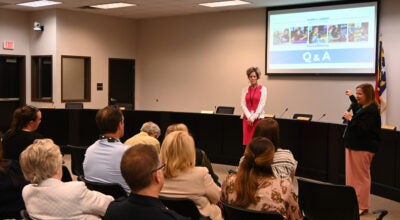Local group to set up safe house for human trafficking victims
Published 12:00 am Friday, August 15, 2014
SALISBURY — Rowan County will soon become the site of a safe house for people trying to escape the trap of human trafficking.
The location will be kept confidential, but the people making it happen want to spread the word far and wide about the prevalence and cruelty of this modern day slavery.
The U.S. Justice Department says 12.3 million adults and children were in forced prostitution and forced labor in 2010. Some 17,500 are believed to be “trafficked” into the United States each year.
“We are naive if we don’t think human trafficking is in Rowan County,” says Jim Duncan, who is spearheading the local effort to combat this crime. “… We all can and must act now. We can and will protect our victims and potential victims.”
Working with the Salvation Army and several other agencies, Duncan has started Project FIGHT-Rowan County — Free Individuals who are Gripped by Human Trafficking — and hopes to establish a safe house by 2016.
More than two dozen people gathered on Aug. 6 to form a task force focussed on human trafficking. Their mission: raise awareness and open avenues of escape. Meanwhile, the Triad Ladder of Hope, a faith-based non-profit dedicated to ending human trafficking, is in the process of moving from High Point to Salisbury, where it will be led by Executive Director Mitzi Weber of Salisbury.
Triad Ladder of Hope will operate the safe house, which will be aimed at helping adult victims — forced to be prostitutes or to work as virtual slaves — escape trafficking and rebuild their lives.
“Our goal is to help them to be completely and totally healed and restored,” Weber says. And that will take time.
Weber says if someone had told her three years ago she would be involved in such work, she would have laughed.
“God had other plans. He put the issue before me,” she says. And once she became aware of the problem, she says, she could not walk away.
Weber and people taking lead roles in FIGHT-Rowan describe human trafficking as widespread and lucrative.
Human trafficking is the second biggest illegal trade, after drugs, generating an estimated $32 billion a year, according to Lt. Josh Morse of the Salvation Army.
The Wake County Salvation Army leads Project Fight-N.C. and is sharing its expertise with the FIGHT-Rowan group.
Morse says a person caught up in sex slavery could be forced to have 30 unwanted encounters a day — more than 10,000 a year. At $50 each, that would generate $547,500 in income for the person controlling the victim.
Labor traffickers force their captives to work up to 16 hours a day, every day of the year, he said.
A dealer can sell a unit of drugs or a gun only once; people in human trafficking “sell” their product over and over.
Sherry Earnhardt, a Rowan County 911 telecommunications supervisor and a member of FIGHT-Rowan, says she was completely unaware that human trafficking was here until she heard a presentation by Triad Ladder of Hope.
Not only is human trafficking here, Earnhardt has learned, but the FBI ranks North Carolina eighth in the nation among states most likely to be the site of human trafficking. The factors that make the state ideal in other ways — interstates, beaches, agricultural areas — also make it ideal for human trafficking.
Earnhardt says people who could help victims of human trafficking — law enforcement, 911 dispatchers, the legal community, schools — needed training to be able to detect who might be a victim.
A person who is always accompanied by a controlling person or boss and does not speak on his or her own behalf might be a victim, for example. Another possible sign: The person has little or no control over personal scheduling, documents, money or identification.
The very first week after 911 dispatchers received training, according to Earnhardt, they identified a victim.
The Project FIGHT-Rowan leaders spoke to the Salisbury Rotary Club Tuesday about their initiative.
“We need your help and we need your involvement,” Earnhardt told club members.
Duncan presented Morse a personal check at the Rotary meeting. The time to act is now, Duncan said.
“This effort will take all of us to be involved either prayerfully, financially or physically,” he said.
“Do we want a large volume of human trafficking cases in Rowan County before we get active, or do we want to shut it down? I say let’s be proactive, not reactive. One case of human trafficking is too many.”
FIGHT-Rowan has a first year budget of $107,520, with money coming from a grant and allocations from its Rowan partners. This will enable the group to bring in a full-time case manager and staff through the Salvation Army.
By year three, its plan is to acquire and staff a safe house. An anonymous supporter has already committed to buy a building for the group. The total projected budget for that year, including the house, would be $458,000.
The local push comes as federal authorities also step up efforts to combat human trafficking.
In one week in June, the FBI, law enforcement partners and the National Center for Missing & Exploited Children recovered 168 children who were being victimized through prostitution. Hitting 106 cities, Operation Cross Country VIII also arrested 281 pimps, including three in Charlotte.
“Child sex traffickers create a living nightmare for their adolescent victims,” said Leslie R. Caldwell, assistant attorney general. “They use fear and force and treat children as commodities of sex to be sold again and again.
“This operation puts traffickers behind bars and rescues kids from their nightmare so they can start reclaiming their childhood.”
To report a case of human trafficking, get help or get information, call the National Human Trafficking Resource Center at 1-888-373-7888 or text HELP or INFO to BeFree (233733).





